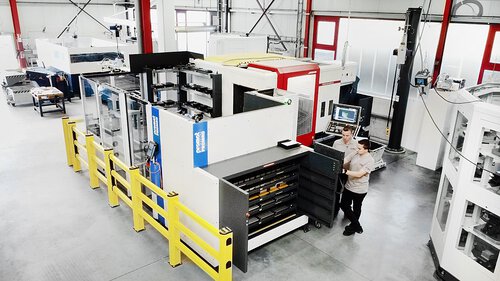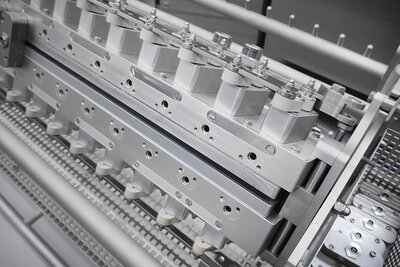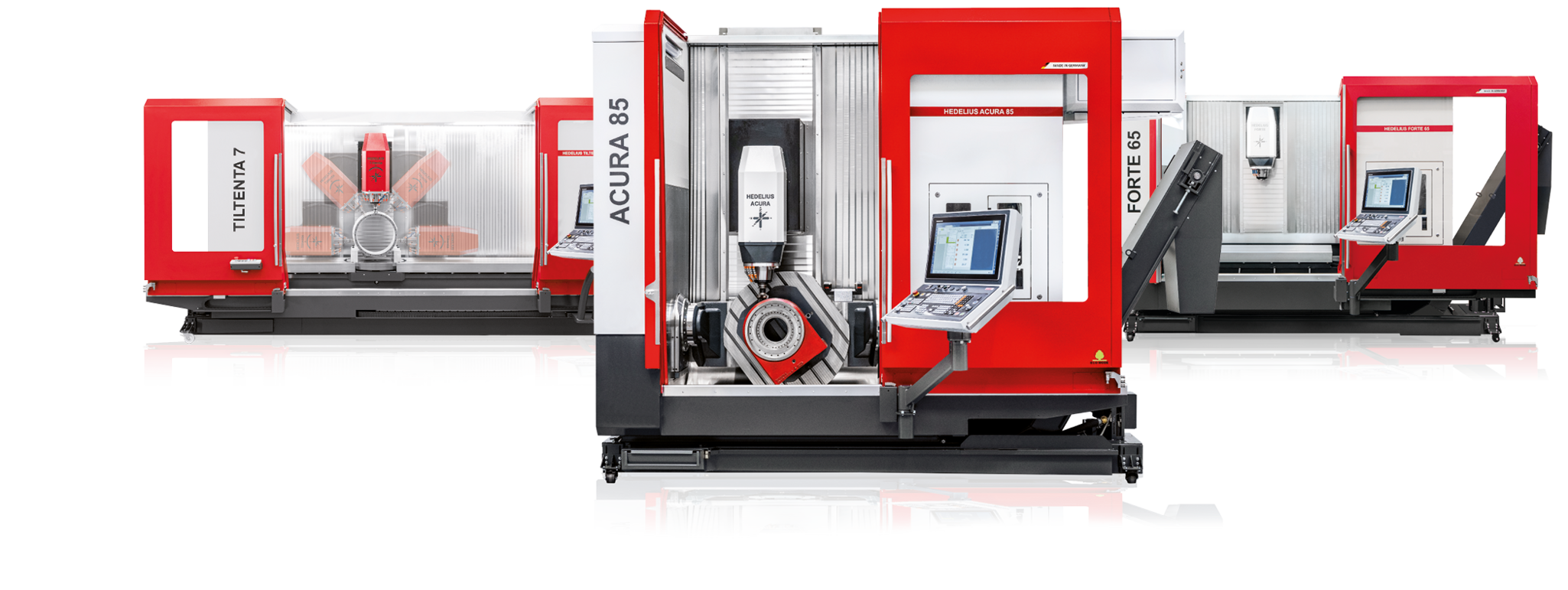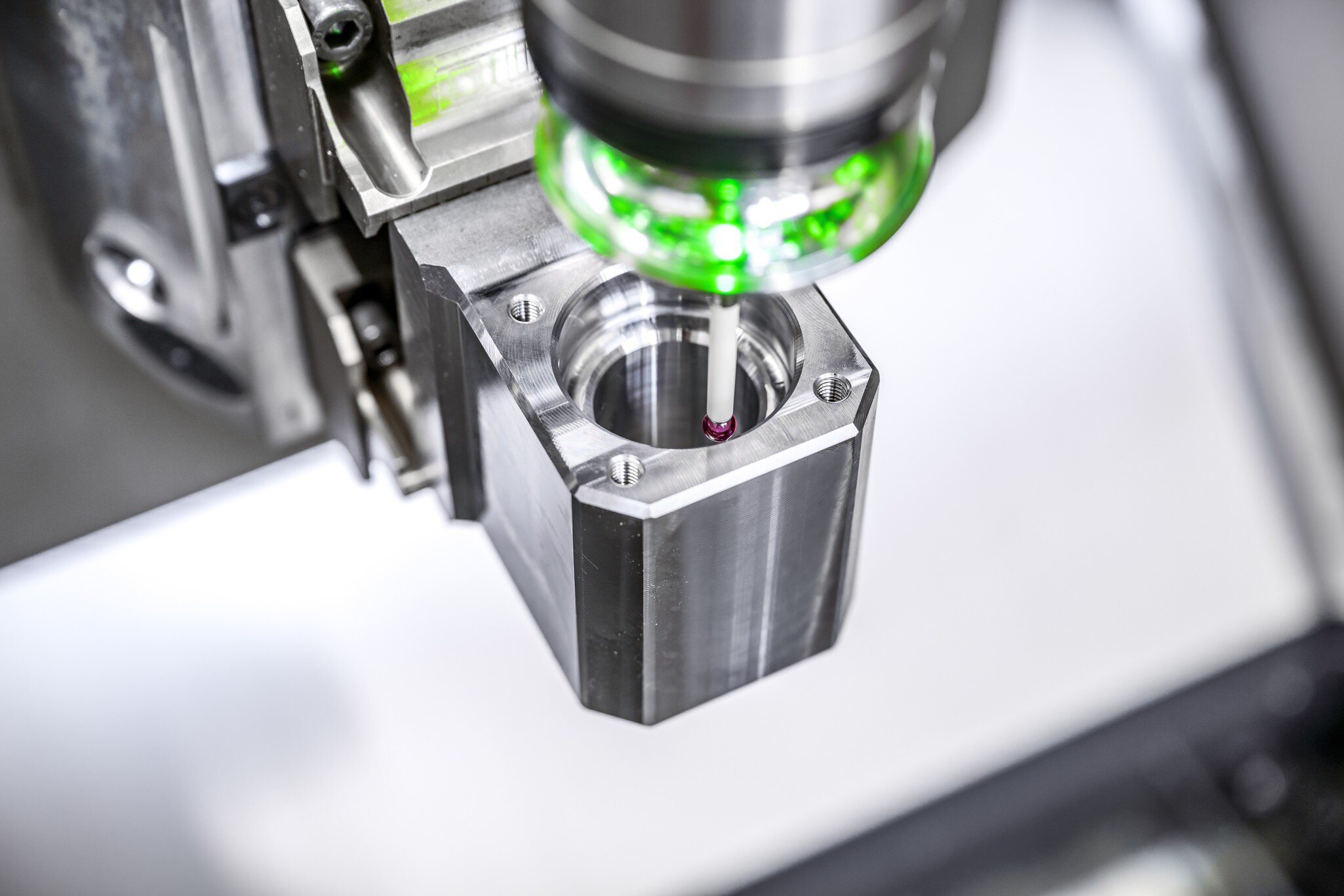SOLLICH KG | FORTE 65 Single 1320, FORTE 6-2300, TILTENTA 6-2300, TILTENTA 9-2600
Field of application: Food and packaging technology | Company headquarters: Bad Salzuflen, Germany | Employees: 400
SOLLICH KG is the global market leader for chocolate processing machines. The family-run company from Bad Salzuflen in East Westphalia faced a major challenge when it came to modernising its chipping machinery. Increasingly complex single parts in a wide range of sizes and lengths have to be manufactured flexibly and efficiently. In HEDELIUS Maschinenfabrik, the company found a partner that could make this possible.
When Robert Sollich founded his bakery and confectionery in Ratibor in Upper Silesia over a hundred years ago, he also laid the foundations for a success story. A few years later, he moved to Rostock and the bakery became an operating company for confectionery and the associated machines. Many of these machines were delivered to East Westphalia, a centre of the confectionery industry at the time. Consequently, Robert Sollich also moved to Bad Salzuflen in 1950, where he focussed on the development of chocolate machines. The 1970s saw the start of industrial production. The second generation of the family business made a significant contribution to this. "Helmut Sollich, son of the company founder, had a decisive influence on the industrial orientation of the company, who managed the company from 1966," explains Kersten Stolpe, Production Manager at SOLLICH. Today, Thomas Sollich is the third generation to manage the company, which has over 400 employees, and the fourth generation is already waiting in the wings. Over the decades, the globally active machine manufacturer has become the market leader for the tempering process of chocolate and for enrobing systems. "Processing chocolate by machine in such a way that it ultimately fulfils the customer's high demands is very difficult and our core competence," explains Stolpe. "However, we don't just supply the customer with the machine, but also the development according to their wishes, practical tests, commissioning and excellent service."
"We are almost like a family."
Everyone at SOLLICH pulls together to realise products and projects in a short space of time while meeting the high standards of hygiene, functional safety and durability. "We are almost like a family, there is hardly any staff turnover, because appreciation and modern company management are very important," says Stolpe, himself a SOLLICH veteran with over 30 years of service. And he adds: "The company lives with its people, we have highly trained skilled workers here with a lot of experience and expertise." And this in turn flows into the design and manufacture of machines. At the same time, modern production facilities are also needed to fulfil the ever-increasing demands of customers. "We almost exclusively manufacture single parts to order, and it often has to be done quickly to fulfil customer requirements. Flexible machining is therefore essential. At the same time, the parts for new machines are becoming increasingly complex," explains Alexander Janott, foreman of chipping at SOLLICH. When it came to renewing the chipping machinery, the company was looking for a supplier that could meet these challenges."
Many different requirements.
From small workpieces to long, heavy components over 3000 mm in length, many different products have to be manufactured, mainly from stainless steel, but also from aluminium and plastic. In addition to these challenges, there were other requirements for the new supplier of machining centres. The aim was to have to reclamp as little as possible, but to be able to produce more sophisticated parts. "The milled parts are becoming more complicated, customers are placing ever higher demands on our machines, and we have to be able to respond to this," says Production Manager Stolpe. After an intensive selection process by a committee of several specialists and managers, the East Westphalian family business found what it was looking for. HEDELIUS Maschinenfabrik GmbH from Meppen in Lower Saxony was able to fulfil the requirements. Foreman Janott is satisfied: "We knew what we needed and the HEDELIUS machining centres are exactly open to our product range and our requirements."
Large machining centres with swivelling main spindle.
At the end of 2017, the first machining centre was then procured by the northern German family business, a FORTE 65 Single 1320 3-axis machine with travel paths of 1320 x 650 x 600 mm (x/y/z). Less than three months later, even before the FORTE 65 was delivered, two 5-axis milling machines with swivelling main spindle from the TILTENTA series were ordered, a T6-2300 with travel paths of 2300 x 600 x 695 mm (x/y/z) and a T9-2600 with 2600 x 900 x 900 mm (x/y/z). "We had flirted with the larger swivelling head machines right from the start," admits Production Manager Stolpe. However, the 3-axis milling machine was purchased first in order to gain experience before commissioning the 5-axis machining centres. As a result, three extremely flexible milling machines went into operation in 2018, allowing the use of rotary tables and swivelling bridges. The clamping of vices in series, vacuum clamping plates or grid plates is also possible without any problems. The HEDELIUS machining centres are therefore extremely versatile. Just as SOLLICH would have wished.
Compactness is convincing.
All three machining centres were ordered with the same control and spindle. They have a HEIDENHAIN TNC 640 control system and a 29 kW spindle with speeds of up to 12,000 rpm. "The employees should be able to switch between all the machines in order to achieve the most efficient single-shift operation possible, and this has worked very well. Our people have adapted really well to the new setting and the new machines," says Kersten Stolpe, praising his employees. The 5-axis machining centres have also each been equipped with a standby tool magazine that holds up to 180 additional tools. This means that the TILTENTA 6-2300 has a tool capacity of 220 places, while the TILTENTA 9-2600 even has 240 places. "Thanks to the standby magazines, we always have all the tools we need for intervention," says a satisfied Michael Nuchte. The chipping foreman is particularly impressed by the many details of the HEDELIUS machining centres. "The machines are easily accessible, not only for the operator, but also for maintenance and servicing, have compact installation dimensions, large viewing windows and a short distance from the spindle nose to the table," says Nuchte. His colleague Alexander Janott adds: "The ratio of the travel paths to the installation dimensions is very good, which is why HEDELIUS is so impressive."
The right partner.
SOLLICH is so satisfied with the first HEDELIUS machining centres that another milling machine was purchased in 2020, naturally also with a HEIDENHAIN TNC 640 control system and 29 kW spindle. The FORTE 6-2300 3-axis machining centre has travel paths of 2300 x 600 x 800 mm (x/y/z) and is also equipped with at least the preparation for a fourth axis, so that swivel bridges can be used and long parts can be machined without major retooling. The FORTE 6-2300 therefore fits perfectly into the SOLLICH production concept. The East Westphalian family business is delighted to have found the right partner for machining centres.
HEDELIUS machining centres of the customer.
More testimonials.

With around 60 employees at its Dillenburg site in Hesse, SIBA Metallverarbeitungs GmbH has been a reliable partner for a wide range of industries for over 60 years. A company that is so comprehensively installed must be able to act highly flexibly in production. This is why SIBA has relied on HEDELIUS machining centres for many years. The company currently relies on two automated systems that ensure maximum precision, unmanned running times and short reaction times: the ACURA 65 EL with PROMOT automation and the ACURA 65 MARATHON with MARATHON SR422 pallet magazine.

Thanks to the TILTENTA 11- 2600, S&S Schliess- und Sicherungssyteme GmbH in Mühlhausen, Thuringia can now produce even more time-efficiently. Thanks to the generous work area, the integrated swivelling spindle concept and high-performance 5-axis complete processing, one clamping is sufficient for S&S to process complex components completely with the TILTENTA 11- 2600.

Heidkamp Metallbearbeitung in Hüllhorst** relies on maximum flexibility, quality and adherence to deadlines in the production of milled parts. The 5-axis machining centre ACURA 65 EL from HEDELIUS, combined with a large tool store, pallet pool and GRESSEL centric clamps, ensures short tooling times, automated individual and small series production and reliable processes, even with complex components and tight delivery deadlines.




















































































































































